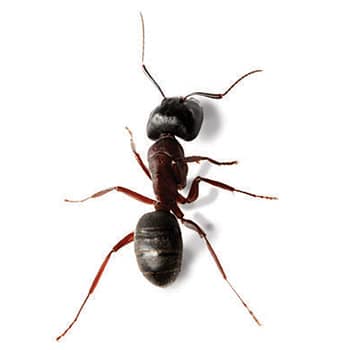NJ Ant Exterminator and Pest Control Services

Ants are some of the most common household pests found in New Jersey. To protect your home or business from ants, you need to learn about the behavior of this pest, take steps for prevention, and find effective treatment options should an infestation occur.
Understanding the Habits and Life Cycle of New Jersey Ant Species
New Jersey pest control experts at Viking Pest explain ants are members of the Formicidae family, distinguished by their segmented bodies, six legs, and highly social communities. Ants live in colonies and work together to provide the resources necessary to reproduce and flourish. New Jersey is home to over a dozen different species of ants, both native and invasive. It can be common for homes and businesses in New Jersey to experience infestations of certain species that wander indoors in a search for food and shelter.
At the heart of every ant colony is at least one female: the queen. When reproducing male and female ants are fully grown, they swarm, flying away and leaving the colonies of their origin. Once they mate, female ants settle into a location where they can establish their colony and shed their wings. The first generation of larvae is fed directly by the queen and eventually grows into adult workers. These workers, forage for new food sources to feed the queen and subsequent generations of new larvae and pupae explain the New Jersey pest management professionals at Viking Pest.
The ant life cycle consists of four distinct phases. Viking Pest’s certified entomologist, Craig, explains originally laid as eggs, ants hatch into larvae, which molt as they feed and grow. Once they reach a size close to that of an adult ant, larvae envelop themselves into a cocoon and metamorphose into their full adult form, which may be that of a female ant (either a queen, worker, or soldier) or a male ant (if it is an unfertilized egg.)
How to Identify New Jersey Pest Ants
Of New Jersey’s numerous ant species, there are a notable few which tend to infest homes and businesses in the region. These commonly include:
- Carpenter Ants: There are eight different species of carpenter ants in the US. Far and away the most common ones found in New Jersey are black carpenter ants. Black carpenter ants are large (workers range from 6 to 13 mm in length) and distinct for their total black coloring. These ants are named for their tendency to nest and burrow into wet or rotting wood. They can also burrow into housing materials, although they seldom cause significant damage to dry, well-maintained structures.
- Pavement Ants: Pavement ants nest underground, often under slabs of concrete or rocks, and emerge to forage for food. Commonly found in households, pavement ants are very small (2–3 mm long) and range in color from dark brown to black. Pavement ants eat almost anything and tend to scavenge sugars, proteins, and grains from household kitchens.
- Pharaoh Ants: Pharaoh ants are commonly believed to have originated from Africa, although they can be found almost everywhere around the world now. Most commonly living in warm regions and urban centers, pharaoh ants can’t live in cold weather, and so seek warm indoor refuge during the winter months in northeastern states like New Jersey.
How to Prevent Ant Infestations in New Jersey Homes and Businesses
For the most part, ants venture into New Jersey homes and businesses in search of food for their colonies. To prevent an accelerating trickle of ants from invading your home or business, it’s essential to limit their access to ready food sources explains the local New Jersey exterminators at Viking Pest. Wise hygiene and maintenance will prevent infestations. Here are some tips to prevent pest ants in New Jersey:
- Keep pet food containers and bowls clean and tidy. If food is left out overnight, maintain a clean perimeter around the bowl and watch for scout ants.
- Remove garbage at the end of each day, rather than leaving it indoors overnight. Cover garbage with a lid and keep it contained in bags.
- Promptly clean all spills thoroughly and prevent sugary smells from attracting pests.
- Inspect and seal all cracks and holes around the house or business’ exterior, and check basement and floorboards for cracks and shifting levels.
- Trim trees and shrubbery around the house or business to prevent ants from utilizing branches as bridges into your building.
Ant Control for Your New Jersey Home or Business From Viking Pest Control
Viking Pest offers expert treatment designed to effectively and efficiently control and prevent ants from invading your home or business in New Jersey. Our use of Integrated Pest Management (IPM) techniques focuses on finding the core of the pest concern and controlling ants from the source. Through IPM, pest control materials are selected and applied in a manner that minimizes risks to human health, pets, and the environment. Call Viking today for your FREE and NO OBLIGATION estimate at 1-800-618-2847 or schedule online today!














